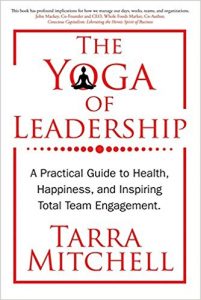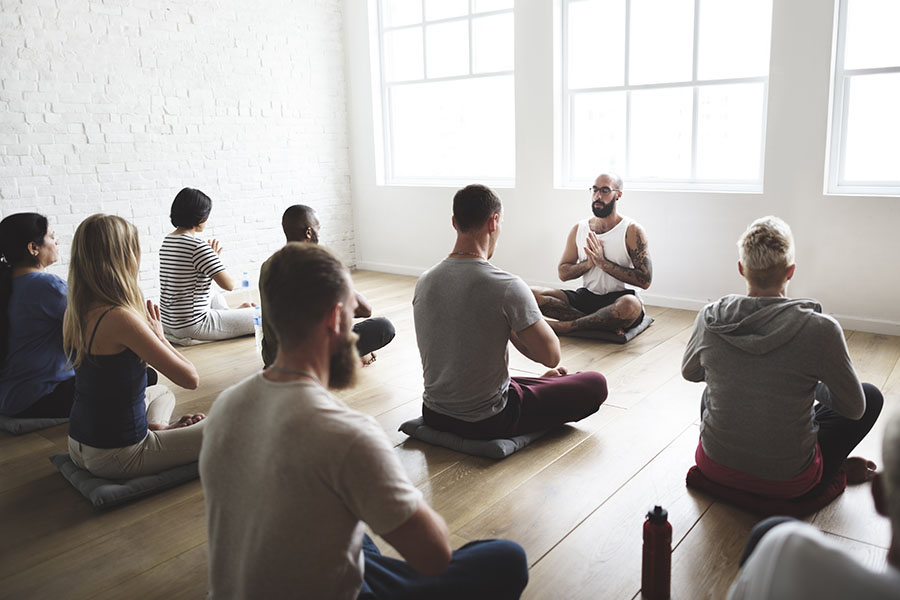As a private equity executive, Tarra Mitchell directed billion-dollar fundraising events and forged international partnerships, all while deepening her 20-year yoga practice.
In her new book, The Yoga of Leadership, Mitchell explores how those two worlds—business and mindfulness—intersect. She maintains that yogic principles can help leaders cultivate resilience, decisiveness, and charisma, while acknowledging that today’s corporate environment doesn’t make that easy for anyone. We caught up with Mitchell to discuss what’s wrong with capitalism, why she still believes in it, and how workers can deal with the constant stress and distraction present in our workdays.
Make Change: What are some of the biggest problems in the traditional 9-5 lifestyle?
Tarra Mitchell: Time management. In my book, I try to convince people that if they prioritize themselves then they’d actually be better and more efficient at their work. Right now it’s such a slog, and everyone is so overstuffed with what they need to do. That really shifted when technology became a regular part of our lives and we became on and wired at every moment of the day. That has led, in my opinion, to the distracted mind, stress, anxiety, and lack of connection with others that we’re seeing today.
MC: What are some of the ways you can prioritize yourself?
TM: In my book I talk about a five-layered framework that came from one of the ancient ideas in yoga. It breaks down into five layers of ourselves: the physical, energy, mind, knowledge, and bliss. In order to feel whole and balanced you need to have some sense of where you’re at in your various layers, and it’s really about picking what you need first.
There are many ways to tackle your wellbeing, and everyone is unique. You may feel the natural thing is to just commit to doing one thing, like getting yourself to the gym once a week, or making more healthy choices in your diet. It could be just being more disciplined about what time you go to bed. It could be starting to have more self-awareness around your emotional wellbeing and emotional state as you move about your day. You just have to start somewhere. Because if you allow yourself to get too emotionally out of whack then you’re not showing up with the qualities necessary to connect and engage your teams. It’s difficult to inspire and motivate anyone if you’re distracted with a monkey mind and you can’t really get a grip.
That’s the reason I focus on leaders: If they take this on and figure out how to fit it into their lives then there might be a shift in the way we work. It’ll be a normal part of work to take care of ourselves as well.
MC: When it comes to getting promotions or better opportunities, isn’t it natural for the employee who gets in early, stays late, and prioritizes work above all else to get the job?
TM: I think that’s a cultural phenomenon, but the more people we have realizing that wellbeing leads to success, the more leaders might start thinking more broadly about their people. If leaders become more aware of the pressure they may be putting on other people and cultivate some self-awareness around whether that’s a good thing for productivity or not, we’ll start to see a shift.
No job is stress-free. Our nervous system is going to go up when we have a deadline or a big project or presentation to do, but that shouldn’t be an all-the-time state of the culture. It should just be for that particular project.
MC: How does wellbeing lead to more productivity?
TM: I’m going to use my yoga example: When people think of yoga, they generally think about doing it on a mat in a classroom, and we can start there. When you’re on the mat, you’re releasing tension in the body, and that’s ultimately what we’re trying to do throughout the day: we’re trying to live stress free. When we do that, it calms our nervous system.
What we also do in a class—especially a vinyasa class—is breathe in a way that calms the nervous system. When we learn how to control our nervous system, to regulate it downward, and to assess whether we’re in an aggravated state or a calm state, then we know what we need to do bring ourselves to neutral. When the nervous system calms, our emotions calm, and our mind calms and clears. [Then] we’re better able to think, be discerning, and to practice clear judgement. We’re better able to listen to whoever’s talking to us, which is another way to build trust with our team.
When our mind is scattered and distracted, we can often find ourselves in this spinning, frenzied state where we’re not getting anything done because we have too much going on in our mind. Any decisions we’re making then probably aren’t the best decisions because we aren’t giving ourselves time to process. Our prefrontal cortex—that’s the evolved part of our brain—requires us to spend a moment and think.
There are different ways to get that state. If not yoga, meditation. If not meditation, something else. But we need something, because it’s a waste of time and productivity if your mind is running and distracted or you can’t get a grip on your emotions.
Being stressed out also degrades your body, which can be problematic down the line.
MC: In your book, you say: “The time is ripe to acknowledge that principled leadership and high-performance can and do go hand in hand. In spite of what some might believe, you can be principled and lead successfully.” Why do you believe this has gotten twisted in the first place?
TM: One of the biggest endorsements in my book is for John Mackey, CEO of Whole Foods Market. He started an organization called Conscious Capitalism, which advocates for free enterprise capitalism as a means for social progress.
The truth is, we’ve taken the definition of capitalism in the wrong direction. We’ve decided, as a sort of business cohort, that capitalism is only in pursuit of investor returns and that’s all that matters. Whereas in John Mackey’s organization and in his book Conscious Capitalism, he discusses how it’s important to consider the ecosystem in which we work, be a conscious leader, have conscious relationships with your stakeholders and be mindful of the environment. Though he takes a different view, he’s definitely a capitalist. He asks that we take pause, consider the way we’ve been functioning and the definition we’ve been using to describe capitalism, and then determine if it’s still working for us or not. We need to ask ourselves if this is the America we want for our future or if there is another way we can be capitalists—because that’s how we’re set up—to allow business to thrive and people to be employed, but to do so in a way that’s in consideration of the eco system.
MC: It’s a stressed, crazy day at the office. Any yoga poses or meditations we should do?
TM: What I usually recommend is a centering practice. If you want to clear your mind from stress, sit quietly, upright, with your eyes closed and take 10 full, deep breaths—inhale for five or six seconds and then exhale for five or six seconds. That brings your nervous system down and clears your mind. Usually, 10 breaths are enough. By the time you’ve hit 10 breaths, your nervous system has subtly changed, and you’re moving from your panic state into your thinking state, where you really should be operating most of the time.
From: Make Change




